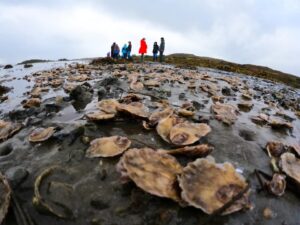Seawilding CEO and founder Danny Renton has won a prestigious environmental award – and he used the moment to remind politicians that communities all over Scotland are interested in restoring lost coastal ecosystems.
Danny won the prestigious Environment award in the National Lottery Awards 2023.
Based on Loch Craignish, Seawilding is the UK’s first community-led native oyster and seagrass restoration project.
Its aim is to restore coastal ecosystems and create green jobs, as well as transform
the education of marine science and conservation.
The National Lottery said bushcraft and survival expert Ray Mears – the author and broadcaster – honoured Danny as “an inspirational environmental hero with a National Lottery Award in recognition of his pioneering work restoring lost biodiversity on the Scottish coastline.”
Mr Mears presented Mr Renton with his prize in Ardfern.
The National Lottery said its awards “celebrate the inspirational people and organisations across the UK who have done extraordinary things with National Lottery funding.”
Seawilding received a grant of £216,400 from The National Lottery Heritage Fund in 2020 to work in partnership with Craignish Restoration of Marine and Coastal Habitats (CROMACH).
Danny founded Seawilding in 2020 and now leads a team of seven staff, with regular support from the local community and up to 60 volunteers.
The Seawilding team uses pioneering methods to restore the loch’s seabed, damaged over time by scallop dredging, over-fishing and pollution – all while training and empowering other coastal communities to follow suit.
“Among the charity’s impressive efforts, the team have spent three years trialling different methodologies to enable seabed restoration at scale in Scottish waters,” said The National Lottery in a statement.
“They have harvested and replanted hundreds of thousands of seagrass seeds to restore lost seagrass meadows, which have capacity to capture carbon at scale.
“In 2023, the team built a small seagrass nursery to research germination rates and they’ve been trialling rhizome transplanting by which thousands of seagrass plants are moved from donor meadows to restoration areas.
“As well as the team’s work in planting seagrass, they are also ‘rewilding’ native oysters which act as natural water filters and create vital fish nurseries and spawning grounds.
“So far, the team have hand-placed around 350,000 junior oysters, around 1.7 tonnes’ worth, on the seabed. They plan to put down another 700,000 in the coming years.”
Danny said: “It takes years to restore damaged eco-systems, but our surveys already indicate that there’s a lot more marine life in the areas we are restoring than before.
“We know it works.
“It’s a real privilege to win a National Lottery Award and receive this recognition for the whole team.
“National Lottery funding has been key to the success of our project. It helped us get started on this important work and for that we are immensely grateful.”
A judging panel whittled down more than 3,700 nominees for the National Lottery Awards to just six winners – and Danny beat off stiff competition to become the winner in this year’s Environment category.
Winners in each category received a £5,000 cash prize for their organisation and a National Lottery Awards trophy.

Mr Mears travelled to Argyll to present Danny with his trophy and learn more about the work of Seawilding.
He said: “Our coastal waters are vitally important so it’s inspiring to see Danny and the Seawilding team doing such groundbreaking work in restoring marine ecosystems.
“They are proof that it’s possible to bring life back to our waters for us all to benefit from – above and below the waves …
“Danny is an inspiring example of empowering a community to take action and use skills and knowledge to make a real difference.”
In an interview, Danny added: “This award is for the team and for the community.
“We rely enormously on our community and that support.
“This is a big message to the politicians …
“We are inundated with interest from communities all around Scotland – there is massive appetite around Scotland to do this.”